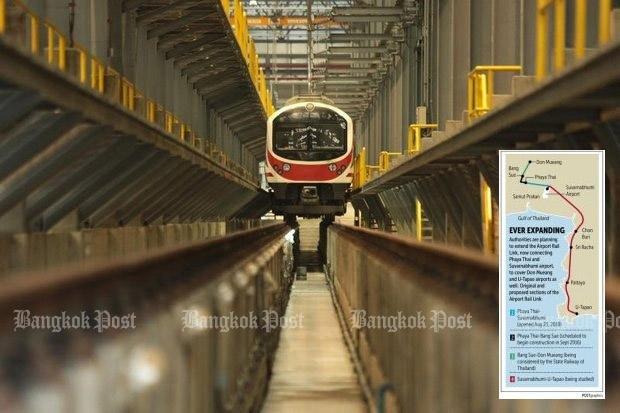Big roles for MRTA, SRT in expansion drive
The Mass Rapid Transit Authority of Thailand (MRTA) and State Railway of Thailand (SRT) are tasked with implementing multiple rail and mass-transit projects under the Bt2-trillion state borrowing programme.
The government is awaiting parliamentary approval for its proposed legislation to borrow the massive amount.
According to Yongsit Rojsrikul, governor of the MRTA, his agency alone is responsible for eight elevated-train and subway projects in Bangkok and peripherals under the programme.
“The Purple Line of 23 kilometres from Bang Yai to Bang Sue is under construction,” Yongsit said. “It’s now 50 per cent completed. Another project, the extended Blue Line, which is more than 20km long, is also under construction. The third project under way is the south Green Line, which is 17km long, from Bearing to Samut Prakan.
“Additional projects under the Bt2-trillion funding scheme include the north Green Line’s 17km extension from Mor Chit to Kukot and the Pink Line from Khae Rai to Min Buri (34km). Bidding for construction contracts will take place this year.
“Next year, we will invite bids for the Orange Line, starting from the cultural centre in Huai Khwang to Min Buri, totalling about 20km. The Bt2-trillion borrowing scheme also covers the Yellow Line from Lat Phrao to Samrong, totalling 30km.
“Altogether, eight projects for a total of six lines will be financed by this borrowing scheme, with funding estimated to be in excess of Bt400 billion for implementation over the next six to seven years. Overall, we’re responsible for 230km of elevated railway and subway.”
Prapat Chongsanguan, governor of SRT, said: “We’re also responsible for part of Bangkok’s suburban train project under the Red Line from Taling Chan to Rangsit totalling 30km. We signed the first and second construction contracts last month. It will take four years to complete.
“Additionally, we will further extend the Airport Link from Makkasan to Don Mueang Airport. We are also assigned to undertake the double-tracking nationwide totalling 3,600km at an estimated cost of about Bt350 billion under the Bt2-trillion borrowing scheme.
“Regarding the high-speed-rail projects, the Bangkok-Chiang Mai line will be more than 600km long, [with its trains] travelling at speeds of 250-300km/h. A one-way trip will take just over three hours compared with eight to nine hours by car at the moment. “The estimated cost for four projects totalling 1,300km is about Bt800 billion, including the Bangkok-Nakhon Ratchasima, Bangkok-Hua Hin, and Bangkok-Rayong routes.
“The latter routes will be further extended to Nong Khai (Northeast), to Padang Besar (South), and Trat (East) in following stages.”
Chackrit Duangphastra of Chulalongkorn University said: “The proposed legislation to borrow Bt2 trillion has some merits.
For example, Thai people and foreign investors are assured that there is a strong commitment to implement these schemes over the next seven years.
“It’s the framework to borrow money but details of each of the projects still need to go through feasibility and other studies. Another strong point is the transport-mode shift from road to rail, which is more efficient in terms of fuel consumption.
“The logistics sector will also benefit from this scheme, which covers construction and expansion of three or four seaports in the South, which could be linked to rail and other modes of transport to lower Thailand’s logistics costs, which are higher than other countries’.
“Thailand’s connectivity with China and Asean countries is another highlight of this borrowing scheme,” he said, as some of the high-speed-rail routes will be able to connect with those of neighbouring countries such as Laos, China, Singapore and Malaysia.
Source: http://www.nationmultimedia.com/business/Agencies-oversee-Bt2-tn-rail-plan-30203991.html
